保护海洋动物演讲稿
保护海洋的动物演讲稿英语
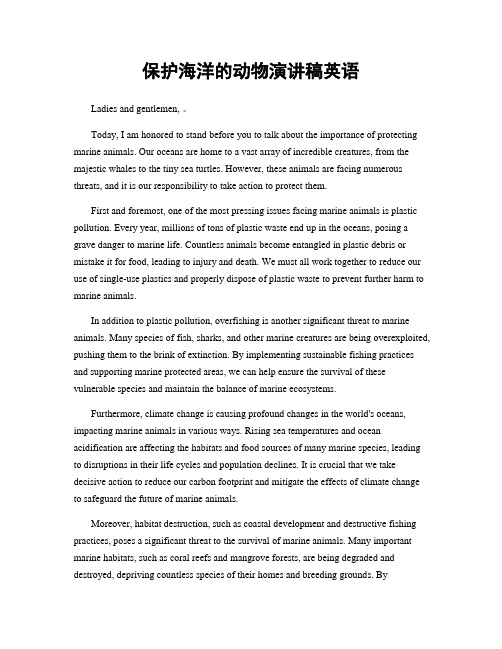
保护海洋的动物演讲稿英语Ladies and gentlemen, 。
Today, I am honored to stand before you to talk about the importance of protecting marine animals. Our oceans are home to a vast array of incredible creatures, from the majestic whales to the tiny sea turtles. However, these animals are facing numerous threats, and it is our responsibility to take action to protect them.First and foremost, one of the most pressing issues facing marine animals is plastic pollution. Every year, millions of tons of plastic waste end up in the oceans, posing a grave danger to marine life. Countless animals become entangled in plastic debris or mistake it for food, leading to injury and death. We must all work together to reduce our use of single-use plastics and properly dispose of plastic waste to prevent further harm to marine animals.In addition to plastic pollution, overfishing is another significant threat to marine animals. Many species of fish, sharks, and other marine creatures are being overexploited, pushing them to the brink of extinction. By implementing sustainable fishing practices and supporting marine protected areas, we can help ensure the survival of these vulnerable species and maintain the balance of marine ecosystems.Furthermore, climate change is causing profound changes in the world's oceans, impacting marine animals in various ways. Rising sea temperatures and ocean acidification are affecting the habitats and food sources of many marine species, leading to disruptions in their life cycles and population declines. It is crucial that we take decisive action to reduce our carbon footprint and mitigate the effects of climate change to safeguard the future of marine animals.Moreover, habitat destruction, such as coastal development and destructive fishing practices, poses a significant threat to the survival of marine animals. Many important marine habitats, such as coral reefs and mangrove forests, are being degraded and destroyed, depriving countless species of their homes and breeding grounds. Bypromoting sustainable coastal development and establishing marine protected areas, we can help preserve vital habitats for marine animals and ensure their long-term survival.In conclusion, protecting marine animals is a critical task that requires the collective efforts of individuals, communities, and governments worldwide. By addressing the issues of plastic pollution, overfishing, climate change, and habitat destruction, we can make a positive impact on the lives of marine animals and the health of our oceans. Let us all commit to taking action to protect these incredible creatures and ensure a sustainable future for our marine ecosystems. Thank you.。
保护海洋动物的英语作文演讲稿
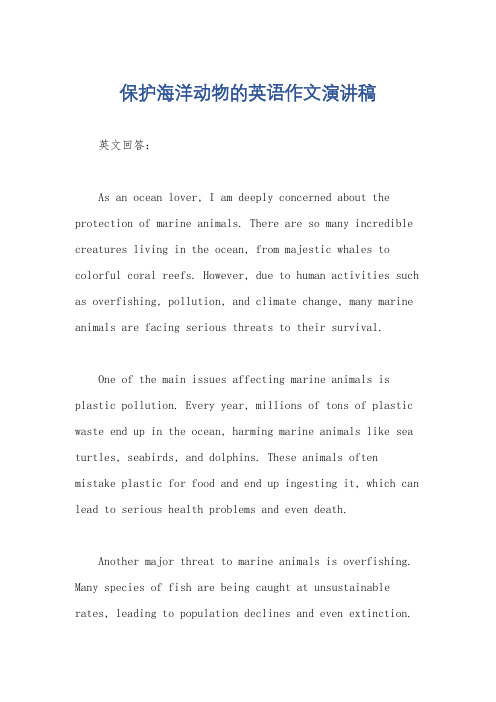
保护海洋动物的英语作文演讲稿英文回答:As an ocean lover, I am deeply concerned about the protection of marine animals. There are so many incredible creatures living in the ocean, from majestic whales to colorful coral reefs. However, due to human activities such as overfishing, pollution, and climate change, many marine animals are facing serious threats to their survival.One of the main issues affecting marine animals is plastic pollution. Every year, millions of tons of plastic waste end up in the ocean, harming marine animals like sea turtles, seabirds, and dolphins. These animals often mistake plastic for food and end up ingesting it, which can lead to serious health problems and even death.Another major threat to marine animals is overfishing. Many species of fish are being caught at unsustainable rates, leading to population declines and even extinction.For example, the population of bluefin tuna has declined by over 90% in the past 40 years due to overfishing.Climate change is also having a devastating impact on marine animals. Rising sea temperatures and ocean acidification are causing coral reefs to bleach and die, threatening the countless species that rely on them for food and shelter. Additionally, extreme weather events like hurricanes and typhoons are becoming more frequent and intense, further endangering marine animals.It is crucial that we take action to protect marine animals and their habitats. This can be done through implementing stricter regulations on fishing practices, reducing plastic waste, and addressing climate change through sustainable practices. By working together, we can ensure a healthy and thriving ocean ecosystem for future generations to enjoy.中文回答:作为一个热爱海洋的人,我深深关注海洋动物的保护。
海洋动物演讲稿幼儿园

尊敬的老师们、亲爱的同学们:大家好!今天,我要给大家带来一个充满奇幻色彩的演讲——海洋动物的世界。
海洋,这个神秘而广阔的世界,孕育了无数奇特的生物,它们构成了一个丰富多彩的海洋生态系统。
接下来,让我们一起走进这个奇妙的世界,探索海洋动物的奥秘。
首先,让我们来认识一下海洋的广阔。
地球上的海洋总面积约为3.6亿平方公里,占地球表面积的71%。
海洋分为四大洋:太平洋、大西洋、印度洋和南极洋。
每个大洋都有其独特的地理位置和气候特征,为各种海洋生物提供了生存的环境。
那么,海洋中都有哪些有趣的动物呢?下面,我就为大家介绍几种常见的海洋动物。
一、海豚海豚是海洋中最为聪明的动物之一。
它们拥有高度发达的大脑,能够进行复杂的思考和交流。
海豚是一种群居动物,它们会组成庞大的群体,一起捕食、玩耍甚至救助同伴。
最令人惊叹的是,海豚还会进行跳跃表演,展示它们优雅的身姿。
海豚是人类的朋友,它们在海洋救援、科研等领域发挥着重要作用。
二、鲸鱼鲸鱼是海洋中最大的动物,也是哺乳动物。
鲸鱼种类繁多,有蓝鲸、抹香鲸、座头鲸等。
蓝鲸是世界上最大的动物,体长可达30多米,体重可达190吨。
鲸鱼以浮游生物为食,它们在海洋中游弋,对维持海洋生态平衡具有重要意义。
此外,鲸鱼还是海洋文化的重要组成部分,许多传说和故事都围绕着鲸鱼展开。
三、海龟海龟是一种古老的爬行动物,它们生活在海洋中,有着坚硬的甲壳。
海龟种类繁多,有绿海龟、玳瑁、 caretta caretta等。
海龟是海洋生态系统中的重要一员,它们以海草、藻类为食,对海洋生态环境有着重要影响。
然而,由于人类的捕猎和环境污染,海龟的数量正在逐渐减少,保护海龟已成为全球关注的问题。
四、珊瑚珊瑚是一种生活在海洋中的腔肠动物,它们以微小的浮游生物为食。
珊瑚礁是海洋中最重要的生态系统之一,它们为无数海洋生物提供了栖息地。
珊瑚礁的美丽和多样性令人叹为观止,被誉为“海底花园”。
然而,由于全球气候变化和人类活动的影响,珊瑚礁正面临着严峻的生存挑战。
保护动物人人有责的演讲稿(精选10篇)
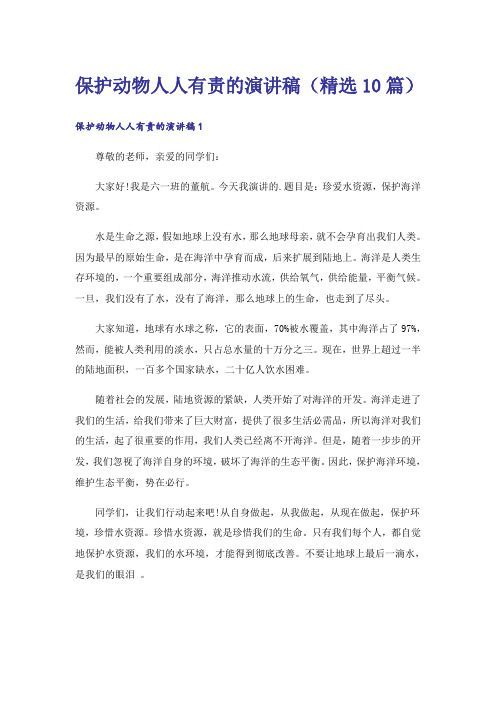
保护动物人人有责的演讲稿(精选10篇)保护动物人人有责的演讲稿1尊敬的老师,亲爱的同学们:大家好!我是六一班的董航。
今天我演讲的.题目是:珍爱水资源,保护海洋资源。
水是生命之源,假如地球上没有水,那么地球母亲,就不会孕育出我们人类。
因为最早的原始生命,是在海洋中孕育而成,后来扩展到陆地上。
海洋是人类生存环境的,一个重要组成部分,海洋推动水流,供给氧气,供给能量,平衡气候。
一旦,我们没有了水,没有了海洋,那么地球上的生命,也走到了尽头。
大家知道,地球有水球之称,它的表面,70%被水覆盖,其中海洋占了97%,然而,能被人类利用的淡水,只占总水量的十万分之三。
现在,世界上超过一半的陆地面积,一百多个国家缺水,二十亿人饮水困难。
随着社会的发展,陆地资源的紧缺,人类开始了对海洋的开发。
海洋走进了我们的生活,给我们带来了巨大财富,提供了很多生活必需品,所以海洋对我们的生活,起了很重要的作用,我们人类已经离不开海洋。
但是,随着一步步的开发,我们忽视了海洋自身的环境,破坏了海洋的生态平衡。
因此,保护海洋环境,维护生态平衡,势在必行。
同学们,让我们行动起来吧!从自身做起,从我做起,从现在做起,保护环境,珍惜水资源。
珍惜水资源,就是珍惜我们的生命。
只有我们每个人,都自觉地保护水资源,我们的水环境,才能得到彻底改善。
不要让地球上最后一滴水,是我们的眼泪。
同学们,节约用水,利在当代,功在千秋。
保护环境,保护海洋资源,是一项长期而又艰巨的任务。
让我们珍爱生命,善待自己,保护好我们的家园吧!让我们的每一天,天天都是世界海洋日!让我们携起手来,行动吧!我的演讲完了,谢谢大家!保护动物人人有责的演讲稿2大家好!今天,我要演讲的题目是《珍惜动物》。
现在地球上有许多动物都在面临死亡,所以,我们不再保护动物,最终受害的只有我们。
而现在,人类疯狂捕捉动物,是为了什么?象牙,用动物制成的皮毛?不,都不是,是为了填饱虚荣心。
为了虚荣心就能对动物做伤天害理的事情吗?那人类真是太自私了。
保护海洋动物演讲稿
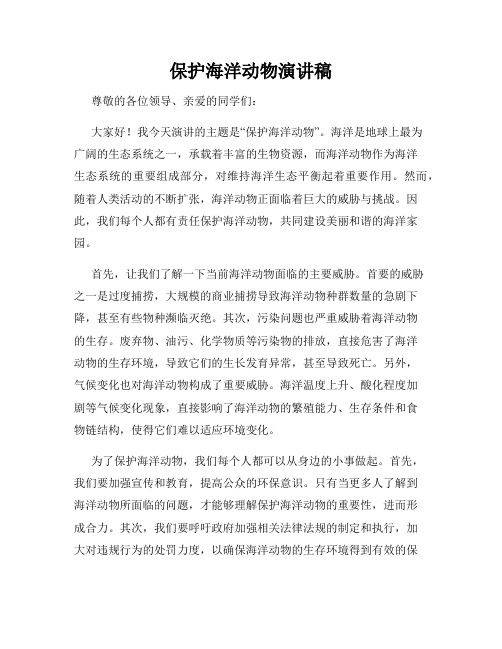
保护海洋动物演讲稿尊敬的各位领导、亲爱的同学们:大家好!我今天演讲的主题是“保护海洋动物”。
海洋是地球上最为广阔的生态系统之一,承载着丰富的生物资源,而海洋动物作为海洋生态系统的重要组成部分,对维持海洋生态平衡起着重要作用。
然而,随着人类活动的不断扩张,海洋动物正面临着巨大的威胁与挑战。
因此,我们每个人都有责任保护海洋动物,共同建设美丽和谐的海洋家园。
首先,让我们了解一下当前海洋动物面临的主要威胁。
首要的威胁之一是过度捕捞,大规模的商业捕捞导致海洋动物种群数量的急剧下降,甚至有些物种濒临灭绝。
其次,污染问题也严重威胁着海洋动物的生存。
废弃物、油污、化学物质等污染物的排放,直接危害了海洋动物的生存环境,导致它们的生长发育异常,甚至导致死亡。
另外,气候变化也对海洋动物构成了重要威胁。
海洋温度上升、酸化程度加剧等气候变化现象,直接影响了海洋动物的繁殖能力、生存条件和食物链结构,使得它们难以适应环境变化。
为了保护海洋动物,我们每个人都可以从身边的小事做起。
首先,我们要加强宣传和教育,提高公众的环保意识。
只有当更多人了解到海洋动物所面临的问题,才能够理解保护海洋动物的重要性,进而形成合力。
其次,我们要呼吁政府加强相关法律法规的制定和执行,加大对违规行为的处罚力度,以确保海洋动物的生存环境得到有效的保护。
此外,我们还可以参与到志愿者的行列中,积极参与海洋动物保护的相关活动,发挥自己的力量,为海洋动物呐喊助威。
此外,在日常生活中,我们还要注意自己的行为对海洋动物的影响。
例如,不乱扔垃圾,饭后不倾倒油渣,合理使用海洋资源等等。
这些看似微小的行为,却能够对保护海洋动物起到积极的作用。
在决策消费时,选择那些符合环保理念的产品,拒绝购买非法捕捞和非可持续发展的商品。
保护海洋动物是一项长期而艰巨的任务,需要全社会的共同努力。
作为新时代的中学生,我们应当立足于自身,在生活中践行环保理念,树立正确的价值观和保护意识。
让我们从小事做起,通过行动加入到保护海洋动物的行列中,为建设美丽的海洋家园贡献自己的力量。
抹香鲸演讲稿

抹香鲸演讲稿尊敬的评委、亲爱的同学们:大家好!我今天要给大家分享的主题是“抹香鲸”。
抹香鲸,是一种生活在海洋中的哺乳动物,也是世界上最大的动物之一。
它们的体型庞大,体长可达30米,体重可达100多吨。
抹香鲸以其独特的外形和壮丽的身姿,吸引了无数人的关注和研究。
首先,抹香鲸是海洋生态系统的重要组成部分。
它们是海洋食物链的顶级捕食者,以鱼类、鱼虾等为食。
抹香鲸的存在保持了海洋生态系统的平衡,维护了海洋生物多样性。
如果没有抹香鲸的存在,海洋中的鱼类数量将会失控,导致整个生态系统的崩溃。
其次,抹香鲸对人类的意义也非常重要。
抹香鲸是海洋生物的“清道夫”,它们会吞食大量的死亡动物和废弃物,帮助清理海洋环境。
此外,抹香鲸也是海洋旅游的重要资源,吸引了大量的游客前往观赏和研究。
这不仅为当地经济带来了巨大的收益,也促进了人们对海洋环境的保护意识。
然而,抹香鲸目前面临着严重的威胁。
过度的商业捕鲸活动、海洋污染、气候变化等因素都对抹香鲸的生存环境造成了巨大的压力。
据统计,抹香鲸的数量已经大幅减少,一些物种甚至濒临灭绝。
这对于整个海洋生态系统来说,都是一个巨大的损失。
面对这一情况,我们每个人都应该积极行动起来,保护抹香鲸和海洋生态环境。
首先,我们应该加强对抹香鲸的保护法律法规的制定和执行,禁止非法捕鲸和销售抹香鲸制品。
同时,我们也要加强对海洋环境的保护,减少污染物的排放,保持海洋的清洁和健康。
此外,我们还可以通过宣传和教育的方式,提高公众对抹香鲸保护的意识。
组织一些相关的活动,如海洋保护讲座、抹香鲸观赏等,让更多的人了解抹香鲸的重要性,激发他们对海洋环境保护的热情。
最后,我希望每个人都能行动起来,为抹香鲸的保护贡献自己的力量。
让我们共同努力,为保护抹香鲸和海洋生态环境而奋斗!谢谢大家!。
保护海洋生物演讲稿集合6篇
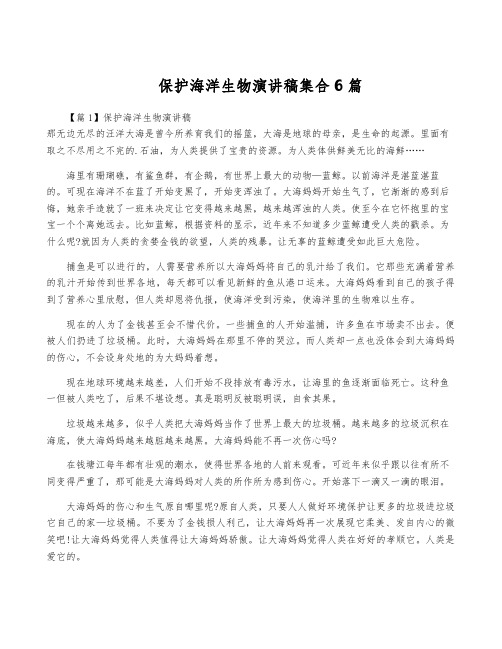
保护海洋生物演讲稿集合6篇【篇1】保护海洋生物演讲稿那无边无尽的汪洋大海是曾今所养育我们的摇篮,大海是地球的母亲,是生命的起源。
里面有取之不尽用之不完的.石油,为人类提供了宝贵的资源。
为人类体供鲜美无比的海鲜……海里有珊瑚礁,有鲨鱼群,有企鹅,有世界上最大的动物—蓝鲸。
以前海洋是湛蓝湛蓝的。
可现在海洋不在蓝了开始变黑了,开始变浑浊了。
大海妈妈开始生气了,它渐渐的感到后悔,她亲手造就了一班来决定让它变得越来越黑,越来越浑浊的人类。
使至今在它怀抱里的宝宝一个个离她远去。
比如蓝鲸,根据资料的显示,近年来不知道多少蓝鲸遭受人类的戳杀。
为什么呢?就因为人类的贪婪金钱的欲望,人类的残暴。
让无辜的蓝鲸遭受如此巨大危险。
捕鱼是可以进行的,人需要营养所以大海妈妈将自己的乳汁给了我们。
它那些充满着营养的乳汁开始传到世界各地,每天都可以看见新鲜的鱼从港口运来。
大海妈妈看到自己的孩子得到了营养心里欣慰,但人类却恩将仇报,使海洋受到污染,使海洋里的生物难以生存。
现在的人为了金钱甚至会不惜代价。
一些捕鱼的人开始滥捕,许多鱼在市场卖不出去。
便被人们扔进了垃圾桶。
此时,大海妈妈在那里不停的哭泣。
而人类却一点也没体会到大海妈妈的伤心,不会设身处地的为大妈妈着想。
现在地球环境越来越差,人们开始不段排放有毒污水,让海里的鱼逐渐面临死亡。
这种鱼一但被人类吃了,后果不堪设想。
真是聪明反被聪明误,自食其果。
垃圾越来越多,似乎人类把大海妈妈当作了世界上最大的垃圾桶。
越来越多的垃圾沉积在海底,使大海妈妈越来越脏越来越黑。
大海妈妈能不再一次伤心吗?在钱塘江每年都有壮观的潮水,使得世界各地的人前来观看。
可近年来似乎跟以往有所不同变得严重了,那可能是大海妈妈对人类的所作所为感到伤心。
开始落下一滴又一滴的眼泪。
大海妈妈的伤心和生气原自哪里呢?原自人类,只要人人做好环境保护让更多的垃圾进垃圾它自己的家—垃圾桶。
不要为了金钱损人利己,让大海妈妈再一次展现它柔美、发自内心的微笑吧!让大海妈妈觉得人类值得让大海妈妈骄傲。
保护海洋动物演讲稿
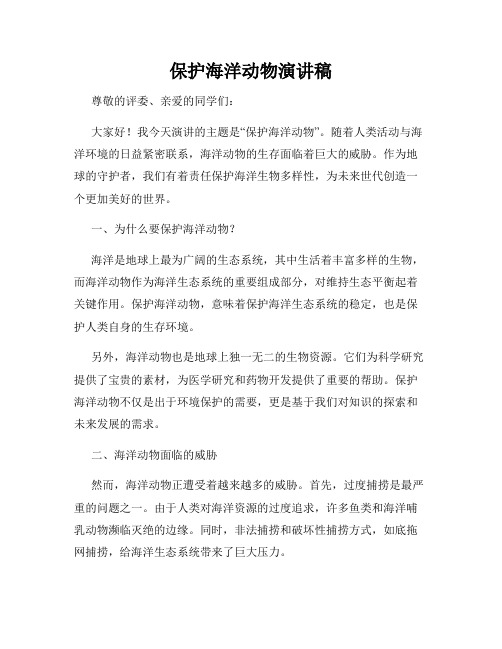
保护海洋动物演讲稿尊敬的评委、亲爱的同学们:大家好!我今天演讲的主题是“保护海洋动物”。
随着人类活动与海洋环境的日益紧密联系,海洋动物的生存面临着巨大的威胁。
作为地球的守护者,我们有着责任保护海洋生物多样性,为未来世代创造一个更加美好的世界。
一、为什么要保护海洋动物?海洋是地球上最为广阔的生态系统,其中生活着丰富多样的生物,而海洋动物作为海洋生态系统的重要组成部分,对维持生态平衡起着关键作用。
保护海洋动物,意味着保护海洋生态系统的稳定,也是保护人类自身的生存环境。
另外,海洋动物也是地球上独一无二的生物资源。
它们为科学研究提供了宝贵的素材,为医学研究和药物开发提供了重要的帮助。
保护海洋动物不仅是出于环境保护的需要,更是基于我们对知识的探索和未来发展的需求。
二、海洋动物面临的威胁然而,海洋动物正遭受着越来越多的威胁。
首先,过度捕捞是最严重的问题之一。
由于人类对海洋资源的过度追求,许多鱼类和海洋哺乳动物濒临灭绝的边缘。
同时,非法捕捞和破坏性捕捞方式,如底拖网捕捞,给海洋生态系统带来了巨大压力。
其次,污染也对海洋动物造成了极大危害。
工业废水、农业化肥和城市生活垃圾等大量排放到海洋中,污染了水质,威胁到海洋生物的生存。
鱼类和海洋哺乳动物在面对有毒物质时,往往成为无辜的受害者。
最后,气候变化对海洋动物的生存和繁衍造成了极大的威胁。
海洋温度上升、海洋酸化、冰川融化等因素改变了海洋生态系统的物理和化学环境,给鱼类和海洋哺乳动物的生存带来了巨大挑战。
三、保护海洋动物的措施为了保护海洋动物,我们需要采取一系列的措施。
首先,加强法律法规的制定和执行,建立全面的海洋保护体系。
各国应加强合作,共同制定国际公约,严禁非法捕捞和损害海洋环境的行为。
其次,加强宣传教育,提高公众的环保意识。
通过开展主题讲座、展览、宣传活动等形式,普及海洋生态保护的知识,让更多的人了解并关注海洋动物的生存境况。
同时,改变消费习惯也是非常重要的一步。
保护海洋动物的英语作文演讲稿
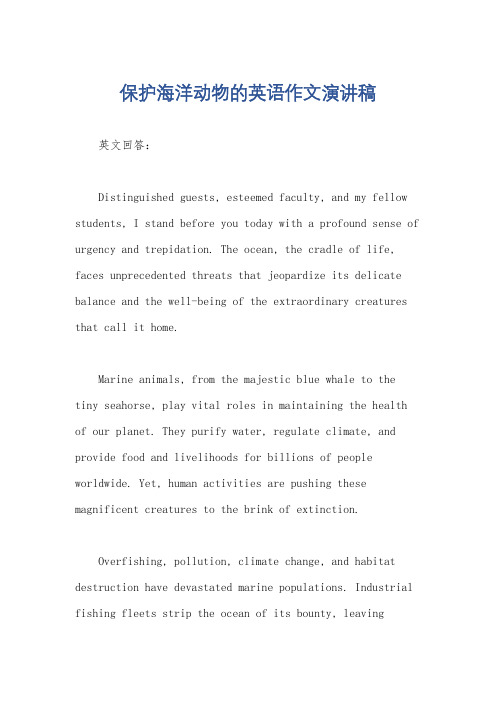
保护海洋动物的英语作文演讲稿英文回答:Distinguished guests, esteemed faculty, and my fellow students, I stand before you today with a profound sense of urgency and trepidation. The ocean, the cradle of life, faces unprecedented threats that jeopardize its delicate balance and the well-being of the extraordinary creatures that call it home.Marine animals, from the majestic blue whale to thetiny seahorse, play vital roles in maintaining the health of our planet. They purify water, regulate climate, and provide food and livelihoods for billions of people worldwide. Yet, human activities are pushing these magnificent creatures to the brink of extinction.Overfishing, pollution, climate change, and habitat destruction have devastated marine populations. Industrial fishing fleets strip the ocean of its bounty, leavingbehind a barren wasteland. Chemical runoff from factories and farms poisons the water, suffocating marine life.Rising sea temperatures bleach coral reefs, destroyingvital ecosystems and the livelihoods of coastal communities. And the destruction of mangrove forests and seagrass beds eliminates critical habitats for countless species.The consequences of these actions are dire. Marine biodiversity is plummeting at an alarming rate, with over a quarter of all marine species now threatened with extinction. The loss of these creatures not only depletesthe ocean's resources but also disrupts entire ecosystems, leading to cascading effects that could have ripple effects on our own survival.Protecting marine animals is not just an environmental imperative; it is a moral obligation. These creatures have an intrinsic value that transcends their use to humans.They deserve our respect and protection.Fortunately, there are hopeful signs. Around the world, people are waking up to the crisis facing our oceans andare demanding change. Governments are implementing regulations to limit overfishing and pollution. Conservation organizations are working to restore degraded habitats and protect marine species. And individuals are changing their lifestyles to reduce their impact on the environment.We must all do our part to safeguard the future of marine animals. Here are three simple yet powerful actions we can take:1. Choose sustainable seafood. Look for seafood that is certified by independent organizations like the Marine Stewardship Council. This ensures that fish are caught using methods that minimize harm to marine ecosystems.2. Reduce our plastic consumption. Plastic pollution isa major threat to marine life. Bring your own reusable bags and containers, avoid single-use plastics, and recycle whenever possible.3. Support organizations working to protect marineanimals. Donate to charities, volunteer your time, orsimply spread the word about the importance of marine conservation.By working together, we can create a future where our oceans are teeming with life and where marine animals can thrive for generations to come. Let us be the guardians of the sea, the protectors of its inhabitants, and thestewards of its future.中文回答:尊敬的来宾、尊敬的老师、亲爱的同学们,我怀着紧迫感和担忧的心情站在你们面前。
人类对海洋生态的保护演讲稿

人类对海洋生态的保护演讲稿尊敬的各位领导、老师和同学们:
大家好!今天我很荣幸能够站在这里,和大家一起探讨人类对海洋生态的保护问题。
海洋是地球上最为广阔的生态系统,它不仅是我们的生存之源,更是地球上众多生物的家园。
然而,由于人类的过度开发和污染,海洋生态正面临着严重的威胁。
首先,让我们来看看人类对海洋生态造成的破坏。
过度捕捞、海洋垃圾、工业排放等问题已经严重影响了海洋生态系统的平衡。
大量的塑料垃圾不仅污染了海水,还危害了海洋生物的生存;过度捕捞导致了海洋生物的灭绝,破坏了海洋食物链;工业排放导致了海洋酸化,影响了海洋生物的生存环境。
这些问题不仅威胁着海洋生物的生存,也直接影响着人类的健康和生存。
然而,面对这些问题,我们不能束手无策,而是应该采取行动来保护海洋生态。
首先,我们应该加强海洋环境保护意识,减少使用一次性塑料制品,妥善处理废弃物,减少对海洋的污染。
其次,我们应该加强海洋资源的合理利用,控制捕捞量,保护海洋生物的多样性。
最后,我们应该加强海洋科研和监测,了解海洋生态系统
的变化,及时采取措施保护海洋生态。
在保护海洋生态的道路上,我们每个人都应该积极参与,为海洋生态的健康发展贡献自己的力量。
让我们携起手来,共同呵护我们共同的家园,让蔚蓝的海洋永远清澈,让丰富的海洋资源永远丰盈!
谢谢大家!。
人人有责保护动物 演讲稿
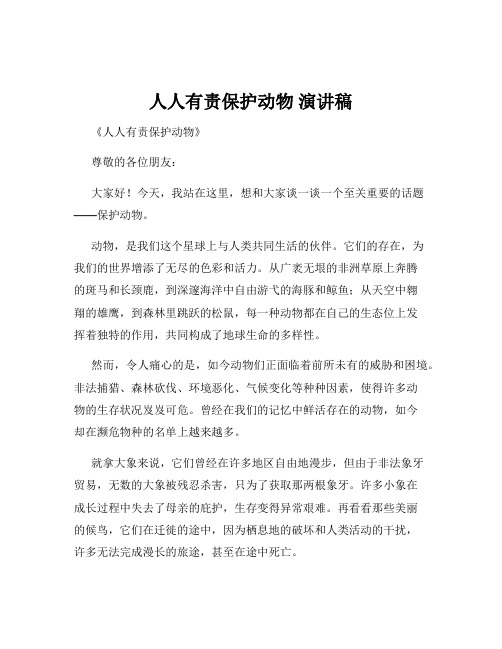
人人有责保护动物演讲稿《人人有责保护动物》尊敬的各位朋友:大家好!今天,我站在这里,想和大家谈一谈一个至关重要的话题——保护动物。
动物,是我们这个星球上与人类共同生活的伙伴。
它们的存在,为我们的世界增添了无尽的色彩和活力。
从广袤无垠的非洲草原上奔腾的斑马和长颈鹿,到深邃海洋中自由游弋的海豚和鲸鱼;从天空中翱翔的雄鹰,到森林里跳跃的松鼠,每一种动物都在自己的生态位上发挥着独特的作用,共同构成了地球生命的多样性。
然而,令人痛心的是,如今动物们正面临着前所未有的威胁和困境。
非法捕猎、森林砍伐、环境恶化、气候变化等种种因素,使得许多动物的生存状况岌岌可危。
曾经在我们的记忆中鲜活存在的动物,如今却在濒危物种的名单上越来越多。
就拿大象来说,它们曾经在许多地区自由地漫步,但由于非法象牙贸易,无数的大象被残忍杀害,只为了获取那两根象牙。
许多小象在成长过程中失去了母亲的庇护,生存变得异常艰难。
再看看那些美丽的候鸟,它们在迁徙的途中,因为栖息地的破坏和人类活动的干扰,许多无法完成漫长的旅途,甚至在途中死亡。
我们不禁要问,为什么要保护动物?保护动物,不仅仅是因为它们的美丽和可爱,更是因为它们对于整个生态系统的平衡和稳定起着至关重要的作用。
每一种动物都是生态链中的一环,一旦某个环节断裂,就可能引发一系列的连锁反应。
比如,蜜蜂作为花粉的传播者,如果它们的数量减少,将会影响到植物的授粉和繁殖,进而影响到整个食物链。
而且,动物还为人类提供了许多宝贵的资源和服务。
比如,牛、羊等家畜为我们提供了食物和衣物;许多动物在医学研究中发挥了重要作用,帮助我们研发新药和治疗疾病;动物的行为和习性也为人类的科学研究和技术创新提供了灵感。
然而,保护动物并非只是政府和相关组织的责任,而是我们每一个人的责任。
那么,作为普通人,我们能做些什么呢?首先,我们要树立正确的观念,尊重每一个生命。
摒弃那种认为动物只是为人类服务和利用的错误想法,认识到它们与我们一样,都有在这个地球上生存的权利。
保护海洋动物的英语作文演讲稿
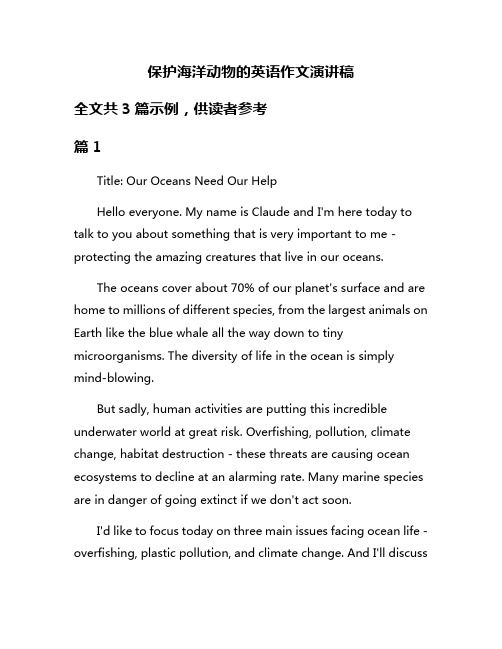
保护海洋动物的英语作文演讲稿全文共3篇示例,供读者参考篇1Title: Our Oceans Need Our HelpHello everyone. My name is Claude and I'm here today to talk to you about something that is very important to me - protecting the amazing creatures that live in our oceans.The oceans cover about 70% of our planet's surface and are home to millions of different species, from the largest animals on Earth like the blue whale all the way down to tiny microorganisms. The diversity of life in the ocean is simply mind-blowing.But sadly, human activities are putting this incredible underwater world at great risk. Overfishing, pollution, climate change, habitat destruction - these threats are causing ocean ecosystems to decline at an alarming rate. Many marine species are in danger of going extinct if we don't act soon.I'd like to focus today on three main issues facing ocean life - overfishing, plastic pollution, and climate change. And I'll discusssome of the things we can do to help address these critical problems.First, let's talk about overfishing. Technological advances have made it possible for industrial fishing operations to remove astounding numbers of fish and other marine life from the ocean at unsustainable rates. Huge trawling nets essentially clear-cut areas, scooping up everything in their paths, including untargeted species like dolphins, turtles, and sharks.According to the UN Food and Agriculture Organization, over one-third of global fish stocks are currently overfished. At the current rate, some scientists predict that if overfishing continues unabated, we could see a complete collapse of the world's fisheries by 2048. That would be absolutely devastating for the health of our oceans.Clearly, we need better regulations and enforcement to prevent overfishing and restore depleted fish populations to sustainable levels. But we can also help as consumers by choosing to buy sustainably caught seafood and avoiding threatened species.The next major threat I want to highlight is plastic pollution. We've all seen those heartbreaking images of seabirds and other marine life found tangled up in plastic debris or with theirstomachs full of plastic they've mistaken for food. The problem is staggering - it's estimated that over 8 million tons of plastic waste ends up in our oceans every year.Plastic is extremely durable and can take hundreds of years to fully break down. As it does, it simply turns into smaller and smaller particles that are ingested by fish and make their way up the food chain. Scientists have found plastic contamination literally everywhere they've looked, including in the deepest ocean trenches.We need to drastically reduce the amount of single-use plastics we produce and use. But we also need better waste management systems to capture plastic waste before it enters waterways and oceans. Supporting cleanups of beaches and coastal areas can also help remove plastics already polluting marine habitats.Finally, I want to discuss the growing threat of climate change to our oceans. You may not realize it, but the oceans play a crucial role in regulating the Earth's climate and weather patterns. They absorb and store large amounts of carbon dioxide and heat from the atmosphere.But this important capacity of the oceans is being overpowered by the higher levels of greenhouse gases we'rereleasing from burning fossil fuels. About 30% of the carbon dioxide released ends up being absorbed by the oceans, causing ocean acidification that makes it difficult for creatures like corals and shellfish to build their shells and skeletons.Warmer ocean temperatures due to climate change are also forcing some fish populations to migrate to cooler waters, disrupting ecosystems. And rising seas from melting ice caps put coastal regions and habitats at risk.The only way to truly address this threat is to urgently transition away from fossil fuels towards renewable, clean energy sources like wind and solar. We must get our carbon emissions under control before it's too late.I hope I've helped illustrate some of the key threats facing marine life today - overfishing, plastic pollution, and climate change. These issues are taking a massive toll on the health and resilience of ocean ecosystems.The good news is, we know what needs to be done. We just need the determination and collective action to do it - through smarter regulations, better waste management, a shift to sustainable practices, and an all-out effort to rapidly move our civilization beyond fossil fuels.The oceans give us so much - from the air we breathe, to the food we eat, to regulating our climate and weather patterns. They are the foundation that all life on Earth depends upon. But they are incredibly fragile too. It's up to us to be responsible stewards and protectors of this vital global resource.We have the power to save marine life from disaster, if we make it a true priority. Just imagine the incredible sights, from vibrant coral reefs to schools of fish, to majestic whales, that we could preserve for future generations. An abundance of healthy, thriving ocean life is possible, if we take action now.Our amazing oceans and the astounding diversity of creatures they hold are a precious gift that we have a profound responsibility to safeguard. Let's not let them down. The time to make saving our oceans a top priority is right now. Who's with me?Thank you.篇2Protecting Our Ocean FriendsHey everyone, thanks for coming out today. I'm here to talk to you all about something that's really important to me –protecting the incredible animals that live in our oceans.We've all seen pictures and videos of whales, dolphins, sharks, sea turtles and other amazing marine creatures. They're beautiful, fascinating, and an essential part of the healthy ocean ecosystems that produce half the oxygen we breathe. But sadly, these animals are under serious threat from human activities.Let me lay out some of the major issues facing ocean life:Overfishing is dramatically depleting fish populations globally. Modern industrial fishing practices like bottom trawling and longline fishing are incredibly destructive, wiping out entire schools and unintentionally killing thousands of non-target species like sharks, rays, sea turtles and dolphins as bycatch.Plastic pollution is choking our seas. Over 8 million tons of plastic waste enters the oceans every year. Microplastics are being ingested by marine animals, harming their health. Abandoned fishing gear and plastic bags can entangle and drown creatures.Climate change is warming and acidifying ocean waters. This is causing widespread coral reef die-offs, affecting marine biodiversity and food chains. Rising sea levels are destroying coastal habitats.Offshore drilling, oil spills and other pollutants from ships and land-based sources are poisoning marine ecosystems. The 2010 Deepwater Horizon disaster in the Gulf of Mexico is just one of many examples of the devastation oil can cause.It's a full-blown crisis that demands urgent action to protect the incredible diversity of life in the oceans before it's too late. Marine scientists warn that continuing on our current path could lead to a complete collapse of fisheries and marine ecosystems globally by 2048.That would be an absolute ecological disaster that could destabilize the entire planet's climate and food supplies. It would also mean the loss of majestic, irreplaceable species like the blue whale, the leatherback sea turtle, and so many other wonders of evolution.We simply cannot allow that to happen on our watch. These remarkable marine animals are our invaluable partners in keeping planet Earth healthy and livable. They deserve to thrive, not just survive.So what can we do? Here are some key things we need to fight for:First, we need a rapid transition to sustainable fishing policies and practices worldwide. That means strictly enforced science-based catch limits, a ban on destructive practices like bottom trawling, and closing more areas to fishing to allow depleted populations to recover.We have to take dramatic action to cut plastic waste and prevent more from entering the oceans through improved recycling, bans on single-use plastics, beach cleanups and better management of waste streams. Holding companies responsible for the full lifecycle of their plastic products could help drive real change.On climate change, the whole world needs to get its act together quickly on slashing carbon emissions to limit further warming and acidification. Protecting coastal habitats like mangrove forests is also crucial.Strict regulations need to be put in place globally to prevent oil spills, limiting offshore drilling and mandating better preventative practices and rapid response capabilities if spills occur.Beyond that, the creation of significantly more marine protected areas where all extractive activities are banned couldhelp preserve biodiversity hotspots and give marine life a chance.On an individual level, each of us can make a difference through our consumer choices and voices. We can cut back on consuming seafood, especially endangered species. We can reduce our plastic use, recycle properly, and participate in beach and community cleanups. Our voices matter - we can call and email our political leaders to demand action on these issues.Marine conservation groups are doing important work too, and they need our support through donations, volunteers and advocacy to keep up the fight to protect the oceans.I know it can all seem overwhelming, like the problems are too big. But keep this in mind - throughout history, major societal changes have happened when people came together, raised awareness and put unrelenting pressure on decision makers. That's how we ended slavery, secured voting rights for women, took on segregation, and made progress on so many other social battles.Marine conservation is simply the next frontier humanity must take on to create a sustainable world. The technology and solutions are there - we just need the will and resolve to put them into action quickly.As a young person, my entire future could be shaped by whether we succeed or fail in protecting the oceans. These animals have been swimming in the seas for millions of years before humans even existed. In my mind, we have absolutely no right to be the generation that drives them to extinction through our carelessness and indifference.Just imagine living in a world where your children and grandchildren only know whales, sharks and sea turtles from books and documentaries because we failed to protect them. That should chill all of us to our core. We have to do better as a society.So I'm asking all of you to open your eyes and hearts to this critical issue. Learn about it, talk about it, make changes in your own life, lobby your leaders, and support the organizations working day in and day out for marine conservation.Raise your voice alongside millions of others across the world who are demanding accountability and action to protect life in the oceans before it's too late.Our incredible marine wildlife needs us now more than ever. They don't have a voice, but we do. It's our responsibility as the stewards of this planet to be that voice and stand up for our ocean friends.Let's accept that responsibility with passion and meet this defining challenge of our time head on. The wondrous beauty and diversity of the oceans is depending on it.Thank you all for your attention today on this vital issue. If we work together, we can absolutely turn this situation around and ensure there are plenty of fish in the sea, coral reefs thriving with life, and whales swimming free for generations to come.篇3Title: Our Oceans, Our ResponsibilityFellow students, teachers, and guests. Today, I stand before you to discuss a topic that should concern each and every one of us - the protection of marine life in our oceans.The oceans cover over 70% of our planet's surface and are home to a vast array of fascinating creatures, from the mighty whale shark to the delicate seahorse. However, these incredible ecosystems are facing unprecedented threats due to human activities, and it is our collective responsibility to take action.Let me paint a picture for you. Imagine a world where the oceans are devoid of life, where the once vibrant coral reefs are reduced to lifeless skeletons, and where the gentle giants of the sea, the whales, are mere memories from a bygone era. Thisbleak scenario is not a distant possibility but a stark reality if we continue on our current path of neglect and exploitation.One of the most pressing issues facing our oceans is plastic pollution. Every year, millions of tons of plastic waste end up in the ocean, choking marine life and disrupting entire ecosystems. Turtles mistake plastic bags for jellyfish, seabirds feed their chicks with plastic fragments, and whales become entangled in discarded fishing nets, often leading to their slow and agonizing deaths.But plastic is just the tip of the iceberg. Overfishing, a practice driven by greed and short-sightedness, has decimated fish populations across the globe. Entire species are being driven to the brink of extinction, and the delicate balance of marine ecosystems is being disrupted, potentially leading to catastrophic consequences.Climate change, too, is taking a heavy toll on our oceans. Rising temperatures are causing coral bleaching events, making it increasingly difficult for these vital organisms to survive. Additionally, the acidification of the oceans due to increased carbon dioxide absorption is making it harder for shellfish and other calcifying organisms to form their protective shells.These are not just statistics or abstract concepts; they are real, tangible threats that affect the very fabric of life on our planet. The oceans are the lungs of our planet, providing us with the oxygen we breathe and regulating our climate. They are also a vital source of food and livelihood for billions of people around the world.But there is hope. If we act now, if we come together as a global community and prioritize the protection of our oceans, we can turn the tide. We can reduce our plastic consumption, transition to sustainable fishing practices, and work towards mitigating the effects of climate change.It starts with each one of us, right here, right now. We can make conscious choices in our daily lives to reduce our plastic footprint, such as carrying reusable bags, choosing products with minimal packaging, and properly disposing of our waste. We can support organizations and initiatives that work towards ocean conservation and sustainable fishing practices.But our efforts must go beyond individual actions. We must raise our voices and demand change from our leaders and policymakers. We must advocate for stronger regulations to curb plastic pollution, implement stricter fishing quotas, and invest in renewable energy sources to combat climate change.Remember, the oceans do not belong to any one nation or individual; they are a shared resource that we all have a responsibility to protect. If we fail to act, we risk losing not only。
大学生保护海洋动物演讲稿关于保护野生动物的演讲稿大学生(三篇)

大学生保护海洋动物演讲稿关于保护野生动物的演讲稿大学生(三篇)大学生爱护海洋动物演讲稿关于爱护野生动物的演讲稿大学生篇一大家好!在早晨的第一缕阳光照耀进来,总有一声声悦耳的鸟叫声在我耳边围绕着,人与小鸟亲切无间,我们应当好好爱护它们。
在森林中,动物与植物的关系也特别亲密。
有的虫子要侵害树木,就有鸟类来吞噬这些虫子,使整个森林处于生态平衡之中。
郁郁葱葱的森林,不仅为动物供应了大量的食物,而且还供应栖息之所。
发过来,很多动物,特殊是鸟类,又爱护了绿色的森林。
但好景不长,人类对鸟类的猎杀行为还是屡见不鲜的,如今鸟类已从以前1万多种削减到现在,只剩下3000多种,人类不仅把射杀一般的鸟类作为猎趣和食物,而且把猎杀大型鸟类的人冠上荣誉称号。
鸟类是野生动物中的一大类,由于有了鸟,人们才会感受到鸟语花香的美妙境地;由于有了鸟,大自然才能真正丰富多彩。
鸟类不仅是森林的爱护神,也是我们人类的朋友。
一只猫头鹰,一个夏天就能为人类从老鼠嘴里夺回一吨粮食。
因此要爱护人类,就要爱护森林,要爱护森林,就要爱护鸟类。
我们还可以制作很多的木盒子,挂在树上,为小鸟们供应优越的栖息之处,让它们生儿育女,更好的生存进展。
这样,既有利于它们的生长生殖,又能爱护森林。
所以,作为大自然中的一员,作为一名中国人民,我们应当从自己力所能及的事情做起,积极参加各种爱护环境的活动,为鸟类供应一个舒适的家园,为将来增加生气与活力。
我的演讲完毕,感谢大家!大学生爱护海洋动物演讲稿关于爱护野生动物的演讲稿大学生篇二演讲是在公众面前就某一问题发表自己的见解的口头语言活动它的特点是:第一,它是在人与人之间进展的;其次,它有肯定的时间性;第三,它是为了阐述某一问题或整理而开展的;第四,它带有肯定的煽动性和说服性。
像演讲竞赛、典礼致辞、会议发言、学术讲座、科研报告、竞选演说、就职演说、法庭陈述等,都带有演讲的性质。
演讲稿是演讲用的文稿,也是演讲的依据。
它是为演讲效劳的,是表达在书面上的讲话材料。
我为鲨鱼代言演讲稿

我为鲨鱼代言演讲稿
尊敬的评委和各位观众,大家好!
今天我要向大家介绍的是生命中最重要的动物之一——鲨鱼。
作为海洋中的顶级掠食者之一,鲨鱼以其强大的捕食能力、独特的外貌和强大的适应能力而著称。
同时,鲨鱼也是一个重要的生态角色,它们是海洋生态系统中的重要组成部分。
鲨鱼不仅是一种美味的食品,还是一种重要的生态角色。
它们通过捕食其他鲨鱼、海龟、鲸鱼和其他海洋生物来维持海洋生态系统的平衡。
此外,鲨鱼也是重要的传粉媒介,它们通过吃掉其他海洋生物的卵和幼崽来传递基因,这对于维
持物种的多样性至关重要。
然而,鲨鱼也面临着一些威胁。
最大的威胁之一是鲨鱼种群数量的快速减少。
由于人类的活动,鲨鱼生存环境受到了破坏,许多鲨鱼种群面临着灭绝的危险。
此外,鲨鱼也是海洋污染的重要受害者。
海洋污染导致了许多鲨鱼的栖息地受到了破坏,并且它们的身体和基因受到了影响。
因此,我们每个人都有责任保护鲨鱼。
我们可以通过减少海洋污染、保护鲨鱼的栖息地和生态系统、推广鲨鱼美食的安全性和可持续性等方式来为鲨鱼保护做出贡献。
最后,我想再次强调,鲨鱼是一种非常独特和美丽的动物,我们应该尊重和保护它们,以确保它们的生存和繁荣。
关于海洋动物保护的演讲稿

关于海洋动物保护的演讲稿亲爱的朋友们:大家好!今天我站在这儿,就像一个刚从海底世界回来的使者,急着和大家唠唠那些海洋动物的事儿,以及为啥我们得好好保护它们。
我记得有一次去海边度假,那片海可美了,沙滩金黄,海浪一波接着一波地涌来。
我正兴奋地在浅海处玩水呢,突然看到不远处有个小身影在扑腾。
我心里一惊,以为是有人溺水了,赶紧游过去。
结果靠近一看,原来是一只小海龟,它的一只鳍好像被什么东西缠住了,正挣扎得厉害。
我小心翼翼地把小海龟捧起来,带回了沙滩上。
它在我手里还不安分地乱动,小眼睛里满是惊恐。
我仔细一看,原来是一根废弃的鱼线缠在了它的鳍上,那鱼线深深地勒进了它的肉里,周围都有点红肿了。
我赶紧找了个小伙伴帮忙,他从包里拿出一把小剪刀,我们俩就开始给小海龟“解困”。
这小海龟可调皮了,它可能是因为害怕,不停地扭动着身体,我一边轻声安慰它,说:“小宝贝,别害怕,我们在帮你呢。
” 一边和小伙伴努力地把鱼线剪开。
好不容易把鱼线弄掉了,小海龟的鳍上却留下了一道深深的伤口。
我们又赶紧跑到附近的小商店,买了一些消毒水和纱布,像照顾小婴儿一样给小海龟处理伤口。
我轻轻地用消毒水给它清洗伤口,小海龟疼得缩了一下,我心里可难受了,就更小心地操作。
然后用纱布给它包扎起来,这小海龟包扎完后,看起来就像个小伤员战士,还挺可爱的。
我把小海龟放在沙滩上,本以为它会马上爬回海里,可它却在我脚边待了一会儿,好像在和我道别。
看着它慢慢爬回海里的背影,我心里既欣慰又有点担忧。
欣慰的是它终于自由了,担忧的是这海里还有多少像它这样受伤的海洋动物呢?从那以后,我就特别关注海洋动物的保护。
我去海洋馆参观的时候,不再只是单纯地看那些海洋动物表演,而是更多地去了解它们的生活习性和生存现状。
我看到那些聪明的海豚和可爱的海狮,它们在表演的时候确实很精彩,但我知道,它们本应该在广阔的海洋里自由自在地遨游,而不是被困在这小小的水池里为了取悦人类而表演。
我还在海边参加过一次志愿者活动,和其他志愿者们一起清理海滩上的垃圾。
我为鲨鱼代言演讲稿
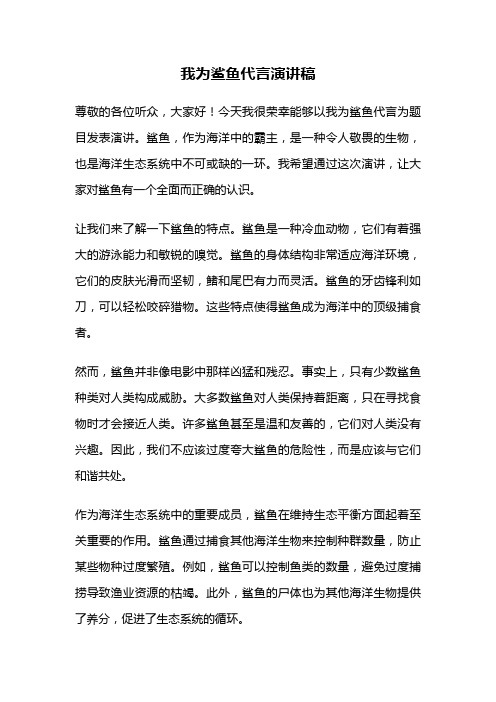
我为鲨鱼代言演讲稿尊敬的各位听众,大家好!今天我很荣幸能够以我为鲨鱼代言为题目发表演讲。
鲨鱼,作为海洋中的霸主,是一种令人敬畏的生物,也是海洋生态系统中不可或缺的一环。
我希望通过这次演讲,让大家对鲨鱼有一个全面而正确的认识。
让我们来了解一下鲨鱼的特点。
鲨鱼是一种冷血动物,它们有着强大的游泳能力和敏锐的嗅觉。
鲨鱼的身体结构非常适应海洋环境,它们的皮肤光滑而坚韧,鳍和尾巴有力而灵活。
鲨鱼的牙齿锋利如刀,可以轻松咬碎猎物。
这些特点使得鲨鱼成为海洋中的顶级捕食者。
然而,鲨鱼并非像电影中那样凶猛和残忍。
事实上,只有少数鲨鱼种类对人类构成威胁。
大多数鲨鱼对人类保持着距离,只在寻找食物时才会接近人类。
许多鲨鱼甚至是温和友善的,它们对人类没有兴趣。
因此,我们不应该过度夸大鲨鱼的危险性,而是应该与它们和谐共处。
作为海洋生态系统中的重要成员,鲨鱼在维持生态平衡方面起着至关重要的作用。
鲨鱼通过捕食其他海洋生物来控制种群数量,防止某些物种过度繁殖。
例如,鲨鱼可以控制鱼类的数量,避免过度捕捞导致渔业资源的枯竭。
此外,鲨鱼的尸体也为其他海洋生物提供了养分,促进了生态系统的循环。
然而,鲨鱼正面临着生存的威胁。
人类的过度捕杀和破坏海洋环境导致鲨鱼种群急剧下降。
据统计,每年有数百万只鲨鱼被捕杀,其中大部分是为了获取鲨鱼鳍制作传统的中药食材。
这种行为不仅导致了鲨鱼数量的减少,也破坏了海洋生态平衡。
我们应该意识到保护鲨鱼的重要性,采取行动保护这些珍贵的生物。
为了保护鲨鱼,我们可以从以下几个方面着手。
首先,加强法律法规的制定和执行,禁止鲨鱼的非法捕杀和交易。
同时,加强对违法行为的打击和处罚力度,让捕杀鲨鱼者付出应有的代价。
其次,开展鲨鱼保护宣传和教育活动,提高公众对鲨鱼的认识和保护意识。
最后,积极参与鲨鱼保护项目,支持科学研究和保护工作。
鲨鱼是海洋中的精灵,我们应该尊重和保护它们。
通过加强保护措施,我们可以确保鲨鱼能够继续在海洋中繁衍生息,维护海洋生态平衡。
三分钟保护动物演讲稿
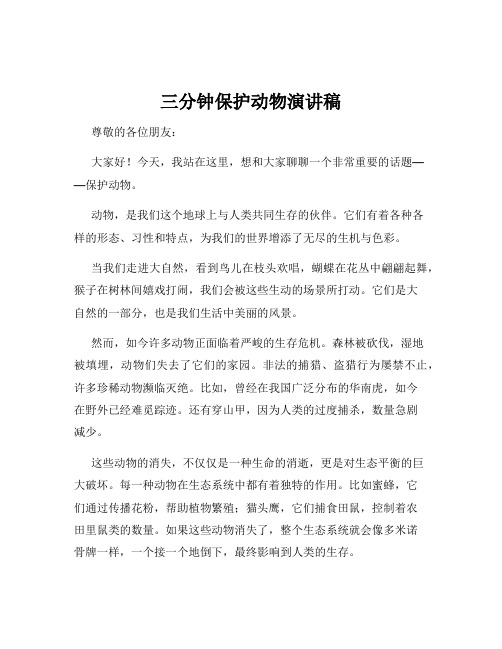
三分钟保护动物演讲稿尊敬的各位朋友:大家好!今天,我站在这里,想和大家聊聊一个非常重要的话题——保护动物。
动物,是我们这个地球上与人类共同生存的伙伴。
它们有着各种各样的形态、习性和特点,为我们的世界增添了无尽的生机与色彩。
当我们走进大自然,看到鸟儿在枝头欢唱,蝴蝶在花丛中翩翩起舞,猴子在树林间嬉戏打闹,我们会被这些生动的场景所打动。
它们是大自然的一部分,也是我们生活中美丽的风景。
然而,如今许多动物正面临着严峻的生存危机。
森林被砍伐,湿地被填埋,动物们失去了它们的家园。
非法的捕猎、盗猎行为屡禁不止,许多珍稀动物濒临灭绝。
比如,曾经在我国广泛分布的华南虎,如今在野外已经难觅踪迹。
还有穿山甲,因为人类的过度捕杀,数量急剧减少。
这些动物的消失,不仅仅是一种生命的消逝,更是对生态平衡的巨大破坏。
每一种动物在生态系统中都有着独特的作用。
比如蜜蜂,它们通过传播花粉,帮助植物繁殖;猫头鹰,它们捕食田鼠,控制着农田里鼠类的数量。
如果这些动物消失了,整个生态系统就会像多米诺骨牌一样,一个接一个地倒下,最终影响到人类的生存。
我们应该怎么做才能保护它们呢?首先,我们要拒绝购买和使用来自濒危动物的制品。
比如象牙、犀牛角、虎皮等。
没有买卖,就没有杀害。
其次,我们要支持和参与动物保护的公益活动,向更多的人宣传保护动物的重要性。
我们还可以通过捐款、志愿服务等方式,为动物保护组织提供帮助。
作为个人,在日常生活中,我们也能为保护动物出一份力。
比如,减少使用一次性塑料制品,因为这些垃圾可能会进入海洋,威胁到海洋动物的生命。
在公园里,不随意投喂野生动物,以免改变它们的饮食习惯和生存能力。
保护动物不是一句空洞的口号,而是需要我们每个人实实在在的行动。
让我们从现在开始,从身边的小事做起,用我们的爱心和行动,为动物们创造一个更美好的世界。
最后,我想说,保护动物,就是保护我们自己,保护我们共同的家园——地球。
让我们携手共进,让每一种动物都能在这片土地上自由地生活,让我们的地球永远充满生机与活力!谢谢大家!。
